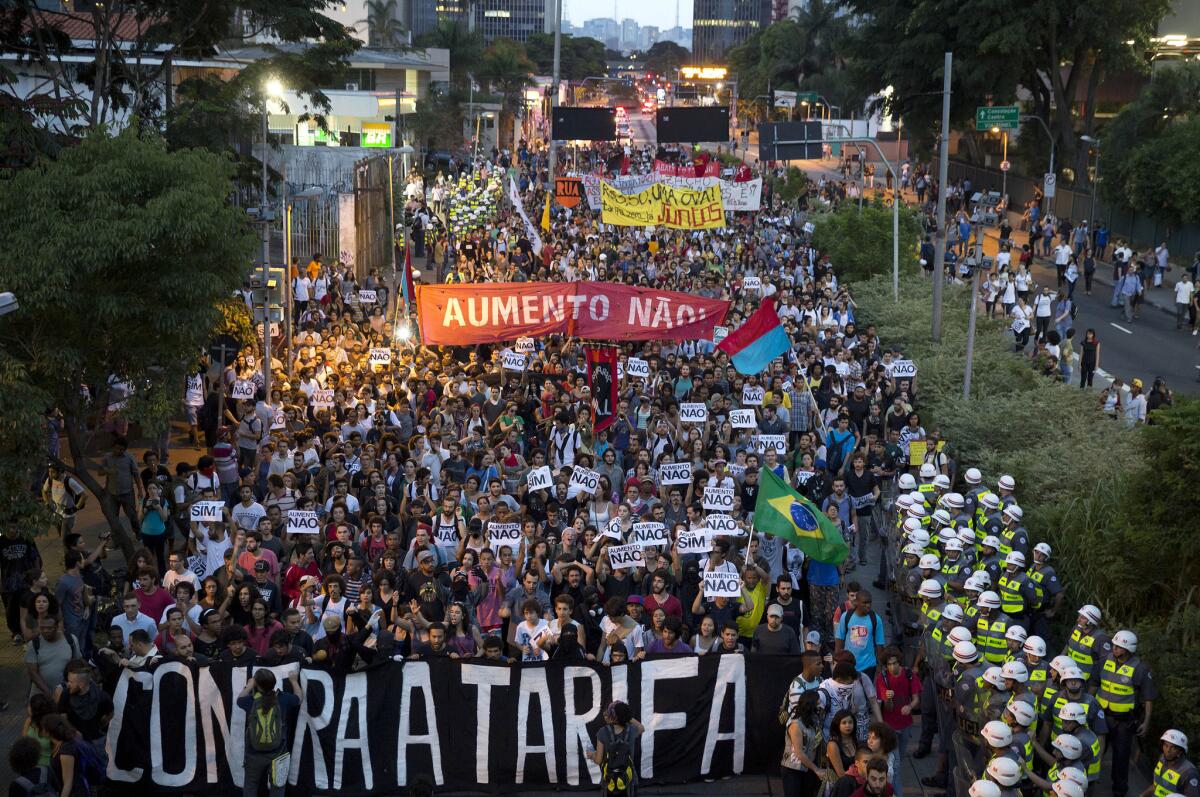In Brazil, a new bus fare increase elicits tepid protests this time

Reporting from Sao Paulo, Brazil â In June 2013, an 8-cent bus fare increase spurred student-led protests that quickly grew into a wider movement in which more than a million people took to the streets nationwide to denounce Brazilâs poor public services, government corruption and police abuse.
That price increase was shelved. But this month, amid a series of difficult spending cuts and tax hikes, authorities have raised fares again, this time by 20 cents, to $1.35.
A new round of protests led by the same student groups has begun but has failed to catch on with the wider population.
Some in Sao Paulo say they are afraid of being caught up in violent clashes between police and protesters or of being associated with property destruction or with protesters who have widely different political visions. Others say they are less excited about politics after last yearâs polarizing election, in which President Dilma Rousseff narrowly won a second term and Congress moved slightly to the right.
âI supported the [2013] movement and took to the streets after almost being assaulted on the street by police during an earlier protest,â said Moara Juliana Santos, 29, a layout designer. âBut after a while, I saw people protesting âagainst all partiesâ or trying to bring down the government, things I wanted little to do with, and decided not to take part anymore.â
As she marched toward City Hall in Sao Paulo on a recent Friday, lab assistant Lourdes Araujo, 65, acknowledged that in the face of a weak economy and vows by the government to make budget cuts, she and a few thousand other protesters are unlikely to bring the fare back down again.
âOur job is to protest, even if it doesnât work. If we hadnât taken to the streets in this country over the years, things would be even worse,â Araujo said. âBut weâre still subjected to all kinds of attacks, either on our wallets or from police.â
A few moments later, without issuing an order to disperse, military police launched tear gas into the crowd, which scrambled in all directions, clutching shirts to their wet faces. It was only after a brutal police crackdown that support from across the political spectrum surged for the 2013 protests, but these kind of battles have now become commonplace.
Some Brazilians donât oppose the new fare hike at all, seeing it as an acceptable pill to swallow, given that the city has invested in bike lanes, offered free public transportation to students and frozen the price for monthly passes.
Others, such as Wilma Pereira, a drugstore employee watching a few thousand young protesters march by her workplace recently waving red and black flags, say mass transit is too narrow a focus, considering all the other serious problems that have popped up since 2013.
âYes, I support them [the protesters]. They have to be out there making their voice heard. But if there was one thing I wish we could fix, it would be the water crisis,â said Pereira, 48, who hasnât had running water at her home in the morning or at night since the middle of last year. A particularly bad drought has left Sao Paulo residents without water at certain points, and last week power went out across the country as Brazilians turned air conditioners on full blast. Analysts expect more energy rationing could occur throughout the year.
After an hourlong bus ride home in the midst of a heat wave that knocked out power in 11 states last week, Pereira canât shower when she gets there. She, however, balks at joining protests. âI wouldnât have the courage to enter in the middle of the violence that might explode,â she said. âI have a family.â
Rousseff has appointed a more conservative economic team since her reelection, and her government has set out to meet budget targets by cutting spending and raising taxes. Since December, gasoline prices have been increased twice and limits imposed on support for college students. Tax increases were also announced on cosmetics and imports.More difficult adjustments are expected.
In 2013, bus fares moved to the center of national debate because of the dedication of the Free Fare Movement, a group that calls for the abolition of all transportation fees. The group is again organizing the protests but has been unable to attract anyone beyond core supporters.
âIâm against the fare increase, because our transportation system isnât nearly as good as it should be,â said Bruna Galvao, 27, a digital planner at an ad agency who chose to stay home this time around.
âBut now, I think that in general a lot of people arenât out there because the fare increase is already in place, and the movement might seem utopian.â
Bevins is a special correspondent.
More to Read
Sign up for Essential California
The most important California stories and recommendations in your inbox every morning.
You may occasionally receive promotional content from the Los Angeles Times.










